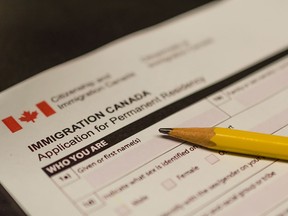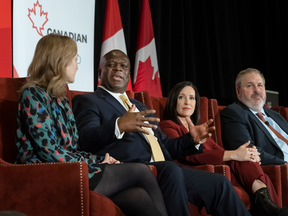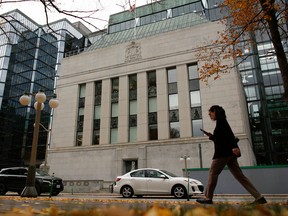Housing seen as major issue in accommodating hundreds of thousands more newcomers
Article content
Prime Minister Justin Trudeau’s government’s decision to not increase its immigration targets this week is being described as a step in the right direction by economists, but they’re urging Ottawa to provide more insight on how they plan to deal with the steep rise in the number of temporary residents.
The immigration targets announced on Nov. 1 predict the number of permanent residents that Canada hopes to welcome in the coming years. Canada brought in more than 400,000 permanent residents last year, but also admitted about 700,000 temporary residents, foreigners who either have a work or study permit, or have claimed refugee status.
Advertisement 2
Article content
Article content
“The government has made some steps in signalling they hear and understand the current challenges of Canada’s immigration systems,” Rebekah Young, an economist at the Bank of Nova Scotia, said. “But holding the 2026 target flat is mostly just signalling at this point. The big numbers come from non-permanent streams and we don’t have a great line of sight where these are going.”
Canada depends on immigrants to boost its economy and its annual immigration plan doesn’t generally attract much debate. But the country is now battling rising prices and a housing crisis, so economists and national studies have urged the federal government to provide more clarity on how it plans to accommodate hundreds of thousands more newcomers.
As such, Canada decided against increasing its targets and will stick to last year’s stated goals of 485,000 permanent residents in 2024 and 500,000 in 2025. The 500,000 cut-off figure will remain for 2026 as well.
CIBC World Markets Inc. deputy chief economist Benjamin Tal said the decision was a “step in the right direction” and added that it reflected the pressure that’s on all parties.
Article content
Advertisement 3
Article content
“People realize that housing is a major issue,” he said. “The next elections will be in part about housing. I think that all parties, including the government, recognize that this is a major issue on the mind of Canadians.”
Despite the decision to plateau the immigration target in 2026, Canada still needs immigration to replace its aging population to a certain extent, said Cynthia Leach, an assistant chief economist at the Royal Bank of Canada.
However, the pause is appropriate, she said, since the annual immigration intake jumped to 1.3 per cent of the population in the past few years compared to the average of 0.8 per cent.
“Let the system adjust and see what else is needed before we consider increasing further,” she said.
She echoed a similar sentiment with regards to non-permanent residents, saying that while international students “make good permanent residents,” the sudden surge in their numbers means that there is a lot more pressure on the infrastructure in the short term. That would make the pathway to permanent residency more difficult for students and harder for the Canadian economy to benefit in the long term.
Advertisement 4
Article content
Related Stories
-

‘Record spike’ in number of immigrants leaving Canada
-

Canadians are questioning immigration targets
-

Halifax is booming — but now it has Toronto problems
Temporary residents also play an important role in the economy along with immigrants, according to Statistics Canada, since they fill critical labour shortages in key sectors, participate in the post-secondary education system and contribute to the economy as consumers.
Robert Kavcic, an economist at the Bank of Montreal, said the latest immigration targets suggest Ottawa is acknowledging that the rate of immigration matters in the short run.
“After years of harping on about housing supply, policymakers and the consensus seem to have suddenly discovered that a demand curve also exists,” he said. “For example, international immigration flows that have run unchecked toward 1.2 million per year is an immediate demand-boosting factor.”
• Email: nkarim@postmedia.com
Bookmark our website and support our journalism: Don’t miss the business news you need to know — add financialpost.com to your bookmarks and sign up for our newsletters here.
Article content
Plateauing immigration levels called ‘step in right direction’
2023-11-02 18:25:44









Comments
Postmedia is committed to maintaining a lively but civil forum for discussion and encourage all readers to share their views on our articles. Comments may take up to an hour for moderation before appearing on the site. We ask you to keep your comments relevant and respectful. We have enabled email notifications—you will now receive an email if you receive a reply to your comment, there is an update to a comment thread you follow or if a user you follow comments. Visit our Community Guidelines for more information and details on how to adjust your email settings.